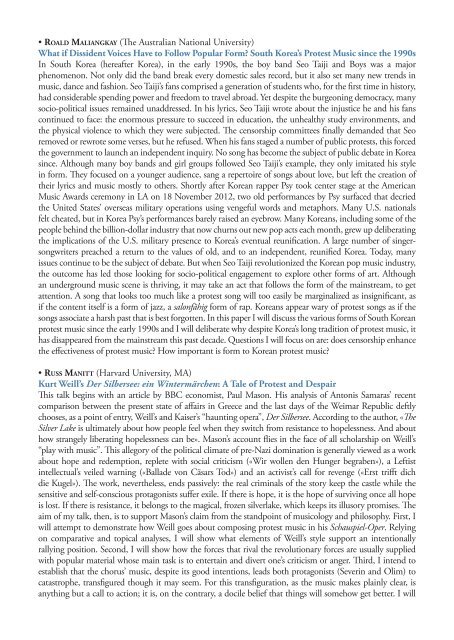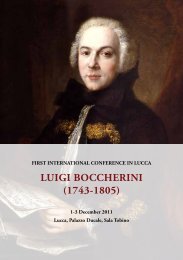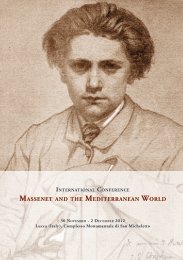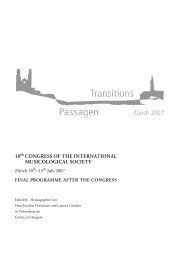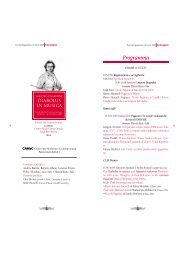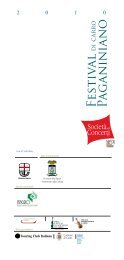PROGRAMME - Centro Studi Opera Omnia Luigi Boccherini
PROGRAMME - Centro Studi Opera Omnia Luigi Boccherini
PROGRAMME - Centro Studi Opera Omnia Luigi Boccherini
Create successful ePaper yourself
Turn your PDF publications into a flip-book with our unique Google optimized e-Paper software.
• Roald Maliangkay (The Australian National University)What if Dissident Voices Have to Follow Popular Form? South Korea’s Protest Music since the 1990sIn South Korea (hereafter Korea), in the early 1990s, the boy band Seo Taiji and Boys was a majorphenomenon. Not only did the band break every domestic sales record, but it also set many new trends inmusic, dance and fashion. Seo Taiji’s fans comprised a generation of students who, for the first time in history,had considerable spending power and freedom to travel abroad. Yet despite the burgeoning democracy, manysocio-political issues remained unaddressed. In his lyrics, Seo Taiji wrote about the injustice he and his fanscontinued to face: the enormous pressure to succeed in education, the unhealthy study environments, andthe physical violence to which they were subjected. The censorship committees finally demanded that Seoremoved or rewrote some verses, but he refused. When his fans staged a number of public protests, this forcedthe government to launch an independent inquiry. No song has become the subject of public debate in Koreasince. Although many boy bands and girl groups followed Seo Taiji’s example, they only imitated his stylein form. They focused on a younger audience, sang a repertoire of songs about love, but left the creation oftheir lyrics and music mostly to others. Shortly after Korean rapper Psy took center stage at the AmericanMusic Awards ceremony in LA on 18 November 2012, two old performances by Psy surfaced that decriedthe United States’ overseas military operations using vengeful words and metaphors. Many U.S. nationalsfelt cheated, but in Korea Psy’s performances barely raised an eyebrow. Many Koreans, including some of thepeople behind the billion-dollar industry that now churns out new pop acts each month, grew up deliberatingthe implications of the U.S. military presence to Korea’s eventual reunification. A large number of singersongwriterspreached a return to the values of old, and to an independent, reunified Korea. Today, manyissues continue to be the subject of debate. But when Seo Taiji revolutionized the Korean pop music industry,the outcome has led those looking for socio-political engagement to explore other forms of art. Althoughan underground music scene is thriving, it may take an act that follows the form of the mainstream, to getattention. A song that looks too much like a protest song will too easily be marginalized as insignificant, asif the content itself is a form of jazz, a salonfähig form of rap. Koreans appear wary of protest songs as if thesongs associate a harsh past that is best forgotten. In this paper I will discuss the various forms of South Koreanprotest music since the early 1990s and I will deliberate why despite Korea’s long tradition of protest music, ithas disappeared from the mainstream this past decade. Questions I will focus on are: does censorship enhancethe effectiveness of protest music? How important is form to Korean protest music?• Russ Manitt (Harvard University, MA)Kurt Weill’s Der Silbersee: ein Wintermärchen: A Tale of Protest and DespairThis talk begins with an article by BBC economist, Paul Mason. His analysis of Antonis Samaras’ recentcomparison between the present state of affairs in Greece and the last days of the Weimar Republic deftlychooses, as a point of entry, Weill’s and Kaiser’s “haunting opera”, Der Silbersee. According to the author, «TheSilver Lake is ultimately about how people feel when they switch from resistance to hopelessness. And abouthow strangely liberating hopelessness can be». Mason’s account flies in the face of all scholarship on Weill’s“play with music”. This allegory of the political climate of pre-Nazi domination is generally viewed as a workabout hope and redemption, replete with social criticism («Wir wollen den Hunger begraben»), a Leftistintellectual’s veiled warning («Ballade von Cäsars Tod») and an activist’s call for revenge («Erst trifft dichdie Kugel»). The work, nevertheless, ends passively: the real criminals of the story keep the castle while thesensitive and self-conscious protagonists suffer exile. If there is hope, it is the hope of surviving once all hopeis lost. If there is resistance, it belongs to the magical, frozen silverlake, which keeps its illusory promises. Theaim of my talk, then, is to support Mason’s claim from the standpoint of musicology and philosophy. First, Iwill attempt to demonstrate how Weill goes about composing protest music in his Schauspiel-Oper. Relyingon comparative and topical analyses, I will show what elements of Weill’s style support an intentionallyrallying position. Second, I will show how the forces that rival the revolutionary forces are usually suppliedwith popular material whose main task is to entertain and divert one’s criticism or anger. Third, I intend toestablish that the chorus’ music, despite its good intentions, leads both protagonists (Severin and Olim) tocatastrophe, transfigured though it may seem. For this transfiguration, as the music makes plainly clear, isanything but a call to action; it is, on the contrary, a docile belief that things will somehow get better. I will


